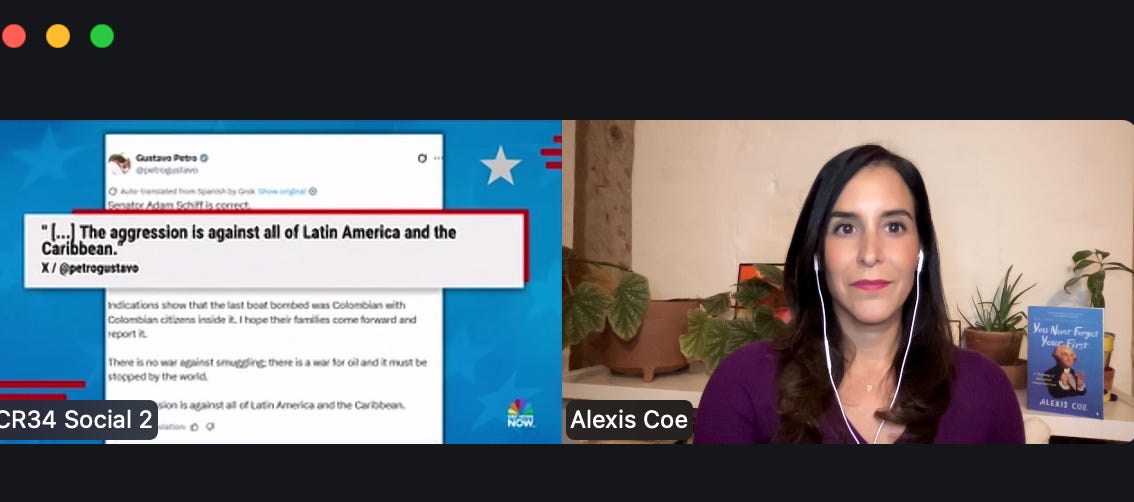
Table of Contents
Trump’s DIY Nobel Campaign
When Oslo Fell for Washington
The Historical Verdict
Trump’s DIY Nobel Campaign
Last night, I went on NBC to talk about Trump’s chances of winning the Nobel Prize. I’d been booked for a 7 a.m. segment as well, just in case. I didn’t set my alarm.
Four American Presidents—Teddy Roosevelt, Woodrow Wilson, Jimmy Carter, Barack Obama—won for expanding the idea of peace, however imperfectly. Donald Trump, by contrast, shrinks it. They built institutions; he built spectacle. They made peace a project; he made it a product.
So how did he make it on the presumably long list? Amnesty International calls his second term “a freefall of rights.” Women, LGBTQ people, journalists, migrants, environmental defenders—all collateral in his domestic culture war. Abroad, he applauded autocrats, shrugged at war crimes, and rewarded allies who traded repression for real estate.
Trump’s Nobel speculation—like most Trump headlines—was manmade by the man himself. He’s been auditioning since 2018, a trait that surely doesn’t appeal to the Nobel Committee. It doesn’t mind controversy, but it hates spectacle.
There’s never enough time on TV, and you can be interrupted twenty seconds in. If it’s a segment, the best one can hope for is five minutes, so I was ready for what I assumed would be the obvious first question: What’s the Nobel Committee looking for?
Endurance.
Peace that survives egos.
Diplomacy that strengthens institutions.
Leaders who build systems.
Of course, there are exceptions, but the through-line is clear: the Committee rewards the architecture of cooperation.
I emphasized that I study the past to understand the present—not predict the past. That being said, based on what the Nobel tends to value, I was confident enough to make the larger point I’d come for.
Awarding a Peace Prize to an anti-democratic, dictator-loving, human-rights-violations enthusiast would be a moral farce.1 When your hands are stained with cruelty at the border, and you toss off lines like “we’ll own Gaza” as if conquest were customer service, you’re not a peacemaker. You’re a brand manager for instability.
I didn’t get to the rest—there’s never time—but I would’ve added this: Trump’s “America First” foreign policy runs directly against the Committee’s multilateral ethos. His legacy isn’t peace-building; it’s rights-building undone. In that ledger, he doesn’t meet the floor, much less the standard.
He can chase the Nobel all he wants. His peacemaking never survives his tweetstorms.
When Oslo Fell for Washington
Every few decades, Oslo anoints a U.S. president for making peace while waging something else. The Nobel has a type: the man who promises harmony with one hand and holds a saber in the other.
Theodore Roosevelt (1906)
Teddy ended the Russo–Japanese War and invented the performance of American mediation. The Treaty of Portsmouth made him the first U.S. president to win a Nobel—and the first to weaponize it.
He preached peace with one hand and built battleships with the other. Socialists called it a travesty; Eugene Debs quipped that giving Roosevelt the Peace Prize was like “giving a burglar a medal for good citizenship.”
Teddy accepted the medal anyway, then sent the Great White Fleet around the world to remind everyone whose navy it was.
Woodrow Wilson (1919)
Wilson got his Nobel for dreaming up the League of Nations, the world’s first collective-security experiment. The Committee crowned the sermon, not the substance.
But while his “Fourteen Points” promised democracy abroad, he resegregated the federal government and sent Marines into Haiti and the Dominican Republic.
When the Senate refused to join the League, the irony wrote itself: the Nobel laureate of global unity was rejected by his own country.
Jimmy Carter (2002)
For Carter, peace was a lifelong practice. The Camp David Accords between Egypt and Israel in 1978 still stand, and the Carter Center became his second presidency—dedicated to election monitoring, human rights, and eradicating disease.
Oslo didn’t have to say it aloud, but the subtext was that Carter built what others bombed.
Barack Obama (2009)
Obama made diplomacy sound possible again after a decade of preemptive war. The Committee admitted it was aspirational, not retrospective—a prize for potential rather than performance.
Obama did “not feel that I deserve to be in the company of so many transformative figures,” but critics agreed. At least for a minute. After shock and awe, a coherent, seemingly earnest sentence about peace felt like progress.
Drone strikes in Pakistan and Yemen, the surge in Afghanistan, and an unclosed Guantánamo darkened the glow.
The Historical Verdict
Every president who’s won the Nobel left a contradiction behind. Roosevelt preached peace through imperial muscle; Wilson through moral hierarchy; Carter through penance; Obama through optimism. Each tried, however imperfectly, to make American power look redemptive, but Trump’s “peace” is transactional, temporary, and always for personal gain.
The Nobel Committee has many sins to atone for, but awarding him the Peace Prize would’ve buried its lowest standard in the gaudiest of graves.
Impress your people—and keep my serotonin levels from filing a grievance—by sharing this post with a friend. And if you’re after that free subscription, share with a few!
I did mention the 2020 Abraham Accords normalized relations between Israel and several Arab states—most of which hadn’t exchanged gunfire in half a century. It was less “peace” than a ribbon-cutting for preexisting interests.
Yes, they shifted regional alignments, but mostly by formalizing them and sweetening the deal with U.S. arms sales. No Palestinian statehood, no disarmament, no reconciliation. Just a handshake, a signature, and a weapons contract.


Great sober, enlightening piece!
https://open.substack.com/pub/morfmorford/p/the-nobel-prize-to-mr-trump-for?r=9hujo&utm_medium=ios&utm_source=post_stats